Even if you are a non-fiction writer, this book is worth reading.
Read MoreReference
What I've been reading: Waterhouse on newspaper style
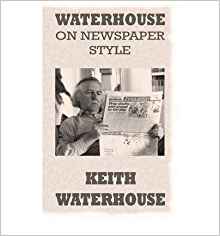
This book may be thirty years old, but its advice is still pertinent. If you want to have a blitz or crackdown against, or shake-up of, bad writing (all examples of 'tabloidese'), then this is the book for you.
Read MoreLists: Bullets or numbers?

When should you use bullet points, and when numbers? Read on to find out.
Read MoreA resource base for writers.
A resource base and more for writers
A specialised writer's search engine, and a free novel organiser.
Read MoreA dictionary is an invaluable resource. Photo from www.pixabay.com CC0
2 strategies and 6 online resources for finding the right words
If you want to make sure that you use the correct word more often than not, you gotta have a plan.
Read MoreYou could let Grammarly take some of the strain of proofreading. Photo by Pink Sherbert Photography https://www.flickr.com/photos/pinksherbet/
Review of Grammarly -- and a competition
Read about a great proofreading tool, and maybe win a year's subscription!
Read MoreReview of Help! for Writers
Writers' block is just one of many writerly ills. In this book, Roy Peter Clark offers over 200 practical tips.
Read MoreWhat do writers earn?
 A recent piece of research from the Authors’ Licensing and Collecting Society (ALCS) makes for some depressing reading – unless you are extremely optimistic.
A recent piece of research from the Authors’ Licensing and Collecting Society (ALCS) makes for some depressing reading – unless you are extremely optimistic.
The figures relate to 2013, and are not as good as their equivalents of ten years ago, in 2005. Well, not for the most part anyway. Here are some of them:
A Writer’s Reference Toolkit: Quotations
 Books of quotations are important, I think, for those odd occasions you need to have one. And that phrase “odd occasions” is the rub: do you actually need to buy a reference book for occasional use when there is so much available on the web these days?
Books of quotations are important, I think, for those odd occasions you need to have one. And that phrase “odd occasions” is the rub: do you actually need to buy a reference book for occasional use when there is so much available on the web these days?A Writer’s Reference Toolkit: Style Guides
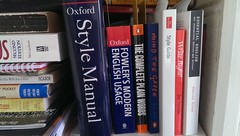 There are two broad kinds of style guide. There is the generic type, containing advice on such things as whether to use “different from” or “different than”. And there is the specific type, ie specific to a particular publication. For example, should “internet” be spelled with a lower case “i”, or as “Internet”?. The specific style guide will tell you.
There are two broad kinds of style guide. There is the generic type, containing advice on such things as whether to use “different from” or “different than”. And there is the specific type, ie specific to a particular publication. For example, should “internet” be spelled with a lower case “i”, or as “Internet”?. The specific style guide will tell you.
You need both types, of course, but unfortunately it’s not quite as simple as your needing only two books or two documents.
A Writer’s Reference Toolkit: Thesauruses
Before anyone tells me that the plural of “thesaurus” should “thesauri” rather than “thesauruses”, which is what I’d have thought myself, apparently it can be either, according to the Oxford dictionary.
I find a thesaurus to be indispensable on those occasions when the most appropriate word is on the tip of my tongue,
A Writer’s Reference Toolkit: Dictionaries
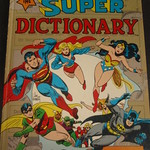 I don't care how good a writer you are, at some point you are going to need dictionary. Whether you need to check the meaning of a word, or the sort of context in which it’s used, or simply to double-check how it is spelt, you will want to use a dictionary. The question is, which one?
I don't care how good a writer you are, at some point you are going to need dictionary. Whether you need to check the meaning of a word, or the sort of context in which it’s used, or simply to double-check how it is spelt, you will want to use a dictionary. The question is, which one?A writer’s Reference toolkit: What?
 If you are going to put together a Reference Toolkit, having been convinced by my article A writer’s Reference toolkit: Why?, what should be included?
If you are going to put together a Reference Toolkit, having been convinced by my article A writer’s Reference toolkit: Why?, what should be included?A writer’s Reference toolkit: Why?
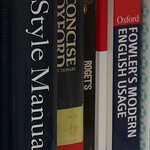 A couple of years ago I wrote an article called Some of my reference books, which described some of the reference books I use, and why. Two years on, I thought it would be interesting to revisit this subject, but in a little more depth.
A couple of years ago I wrote an article called Some of my reference books, which described some of the reference books I use, and why. Two years on, I thought it would be interesting to revisit this subject, but in a little more depth.A brief review of Word Hippo
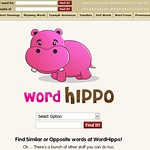 I recently heard about Word Hippo, from a school pupil at Victoria Park Academy in the West Midlands, England. It’s an online dictionary, thesaurus and general all-round word helper.
I recently heard about Word Hippo, from a school pupil at Victoria Park Academy in the West Midlands, England. It’s an online dictionary, thesaurus and general all-round word helper.
I’m used to using the Oxford English dictionary and similar reference works, to which I have access through my library membership, so I wasn't feeling tremendously optimistic when I approached
Some of my reference books
 Just because I love technology and spend a lot of time on the web, and writing for the web, doesn’t mean I’ve eschewed books. I still use books extensively (and intensively) for my writing. Not any books either, but ones written or contributed to by experts.
Just because I love technology and spend a lot of time on the web, and writing for the web, doesn’t mean I’ve eschewed books. I still use books extensively (and intensively) for my writing. Not any books either, but ones written or contributed to by experts.
I think if you’re serious about writing you don’t want to be messing about with so-called “crowd-sourced” information, which may or may not be correct.




